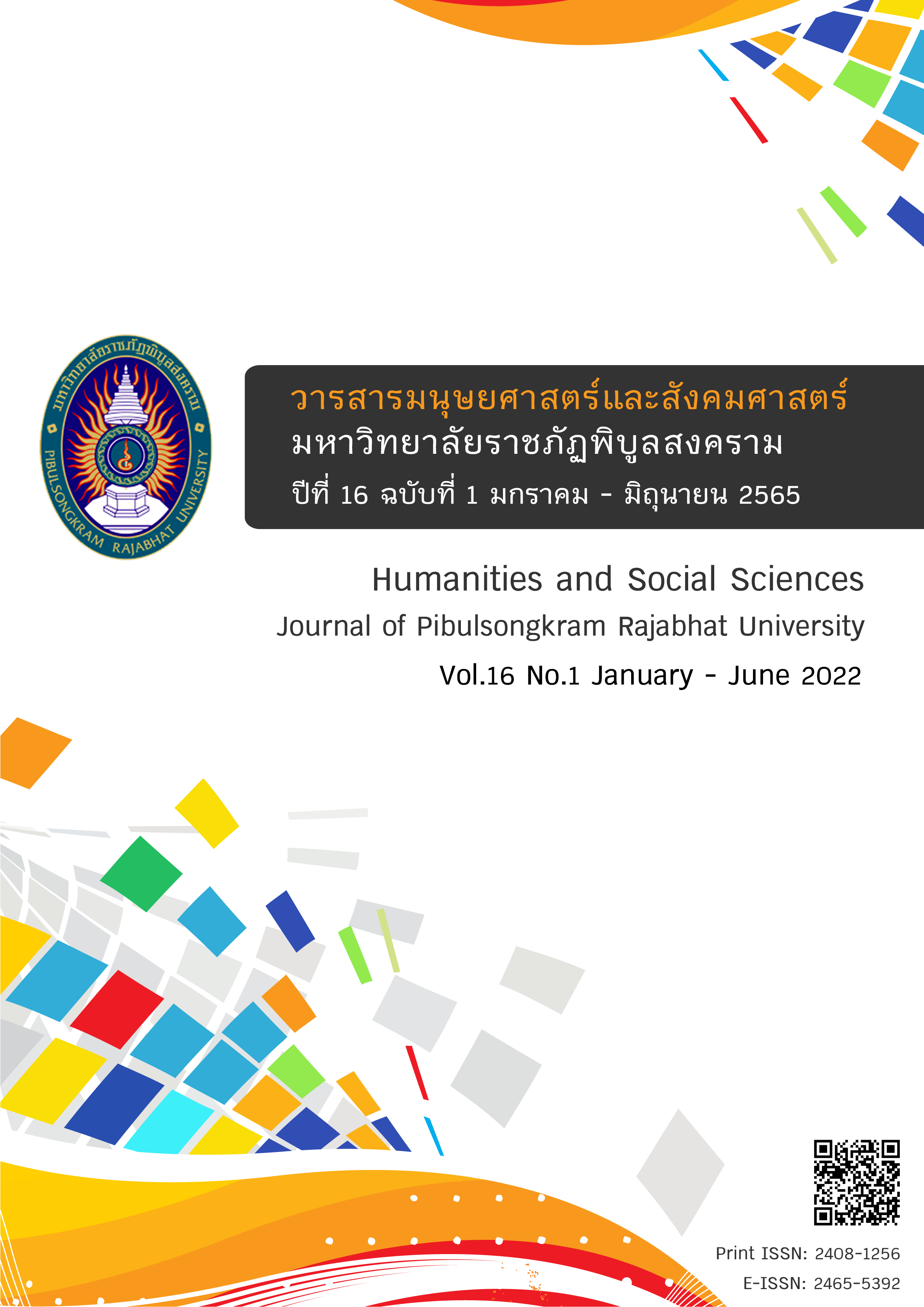Self-Regulation and Psychological Well-Being of Undergraduate Students in Hospitality Industry Program
DOI:
https://doi.org/10.14456/psruhss.2022.26Keywords:
Self-Regulation, Psychological Well-Being, Student, Hospitality IndustryAbstract
The objectives of this research were 1) to study the self-regulation (SR) and psychological well-being (PWB) level of undergraduate students in hospitality industry program 2) to compare the SR and PWB level of students among who had different personal factors; gender, year level, academic achievement, and family income, and 3) to study the relationship between SR and PWB level of students. The sample was 639 undergraduate students in the hospitality industry program from 9 public and private universities selected by multi-stage sampling. The research instruments were multiple-choice and 5 rating scale questionnaires. The data were analyzed using descriptive statistics, independent sample t-test, one-way ANOVA (Analysis of variance), and Pearson correlation coefficient. The research findings were 1) the SR and PWB level of students were at the moderately high level ( = 3.59, S.D.= .47;
= 3.53, S.D.= .46), 2) students with different academic achievement indicated different SR and PWB (p<.01), and there was different SR in students with different family income (p<.05) and, 3) the SR of students was positively related to the PWB (r = .647, p<.01).
References
กองเศรษฐกิจท่องเที่ยวและกีฬา. (2563). สถานการณ์ด้านการท่องเที่ยวไทย. สืบค้น 20 พฤษภาคม 2563, จาก https://mots.go.th/
กิ่งแก้ว ทรัพย์พระวงศ์. (2554). ปัจจัยทางชีวสังคมและบุคลิกภาพของคนไทยตามทฤษฎีห้าองค์ประกอบ. BU ACADEMIC REVIEW, 10(1), 208-219.
ข่าวไทยพีบีเอส. (2563). รู้จัก “New Normal” ฉบับราชบัณฑิตยสภา. สืบค้น 5 มิถุนายน 2563, จาก https://news.thaipbs.or.th/content/292126
คัคนางค์ มณีศรี. (2550). แบบวัดสุขภาวะทางจิต. กรุงเทพฯ: คณะจิตวิทยา จุฬาลงกรณ์มหาวิทยาลัย.
มิ่งสรรพ์ ขาวสอาด. (2563). โควิด-19 กับการท่องเที่ยวที่เปลี่ยนไป. สืบค้น 23 พฤษภาคม 2563, จาก https://www.bangkokbiznews.com/news/detail/875629.
ศูนย์วิจัยกสิกรไทย. (2563). โควิด-19 ฉุดเศรษฐกิจไทยปี 2563. สืบค้น 23 พฤษภาคม 2563, จาก https://is.gd/A2nH0S
สถาพร สู่สุข. (2554). การพัฒนาโมเดลเชิงสาเหตุของการกำกับตนเองด้านความมีวินัยของนักเรียนมัธยมศึกษาตอนต้น (วิทยานิพนธ์ปริญญามหาบัณฑิต). กรุงเทพฯ: จุฬาลงกรณ์มหาวิทยาลัย.
สำนักงานกองทุนสนับสนุนการสร้างเสริมสุขภาพ. (2559). คุณภาพชีวิตต่างวัยของคนมีงานทำ. กรุงเทพฯ: เดือนตุลา.
อุดม คชินทร. (2561). การพัฒนานักศึกษาเพื่อสนับสนุนการเดินหน้าประเทศไทย. [วีดิทัศน์]. โครงการประชุมสัมมนาวิชาการด้านพัฒนานักศึกษาระดับชาติ ครั้งที่ 7. กรุงเทพฯ: โรงแรมเซ็นจูรีพาร์ค.
Bandura, A. (1986). Social foundations of thought and action: A social cognitive theory. Englewood Cliffs, NJ: Prentice Hall.
BBC News. (2020). Coronavirus confirmed as pandemic by World Health Organization. Retrieved from https://www.bbc.com/news/world-51839944
Brown, J. M., Miller, W. R., & Lawendowski, L. A. (1999). The self-regulation questionnaire. In VandeCreek, L. & Jackson, T.L. (Eds.), Innovations in clinical practice: A sourcebook (pp. 281-292). Sarasota, FL: Professional Resource Press/ Professional Resource Exchange.
Cohen, J. (1988). Statistical power analysis for the behavioral sciences (2nd eds). Hillsdale, NJ: Lawrence Erlbaum Associates.
Cronbach, L. J. (1990). Essential of Psychological Testing. New York: Harper & Row.
Daraei, M. (2013). Social correlates of psychological well-being among undergraduate students in Mysore City. Social Indicators Research, 114(2), 567-590.
Durand-Bush, N., McNeill, K., Harding, M., & Dobransky, J. (2015). Investigating stress, psychological well-being, mental health functioning, and self-regulation capacity among university undergraduate students: Is this population optimally functioning?. Canadian Journal of Counselling and Psychotherapy, 49(3), 253 – 274.
Faul, F., Erdfelder, E., Buchner, A., & Lang, A. G. (2009). Statistical power analyses using G* Power 3.1: Tests for correlation and regression analyses. Behavior research methods, 41(4), 1149-1160.
Gaumer Erickson, A. S., Soukup, J. H., Noonan, P. M., & McGurn, L. (2015). Self-Regulation Questionnaire. Lawrence, KS: University of Kansas, Center for Research on Learning.
Hotta, L. T. (2013). Self-regulation is one of the secrets to good mental health. Retrieved from https://www.parentscanada.com/school/self-regulation-is-one-of-the-secrets-to-good-mental-health/
Lynn, M. R. (1986). Determination and quantification of content validity. Nursing Research, 36(6), 382-385.
Parto, M., & Besharat, M. A. (2011). Mindfulness, psychological well-being and psychological distress in adolescents: Assessing the mediating variables and mechanisms of autonomy and self-regulation. Procedia-Social and Behavioral Sciences, 30, 578-582.
Rovinelli, R. J., & Hambleton, R. K. (1977). On the use of content specialists in the assessment of criterion-referenced test item validity. Tijdschrift voor Onderwijsresearch, 2(2), 49-60.
Ryff, C. D., & Keyes, C. L. M. (1995). The structure of Psychological well-being revisited. Journal of Personality and Social Psychology, 69(4), 719-727.
Simon, C. R., & Durand-Bush, N. (2015). Does self-regulation capacity predict psychological well-being in physicians?. Psychology, health & medicine, 20(3), 311-321.
Weis, M., Heikamp, T., & Trommsdorff, G. (2013). Gender differences in school achievement: The role of self-regulation. Frontiers in Psychology, 4, 442.
World Health Organization. (2020). World health statistics 2020: Monitoring health for the SDGs. Geneva: World Health Organization.
Downloads
Published
How to Cite
Issue
Section
License
Copyright (c) 2020 Humanities and Social Sciences Journal of Pibulsongkram Rajabhat University

This work is licensed under a Creative Commons Attribution-NonCommercial-NoDerivatives 4.0 International License.
Any articles or comments appearing in the Journal of Humanities and Social Sciences, Rajabhat Phibulsongkram University, are the intellectual property of the authors, and do not necessarily reflect the views of the editorial board. Published articles are copyrighted by the Journal of Humanities and Social Sciences, Rajabhat Phibulsongkram University.









